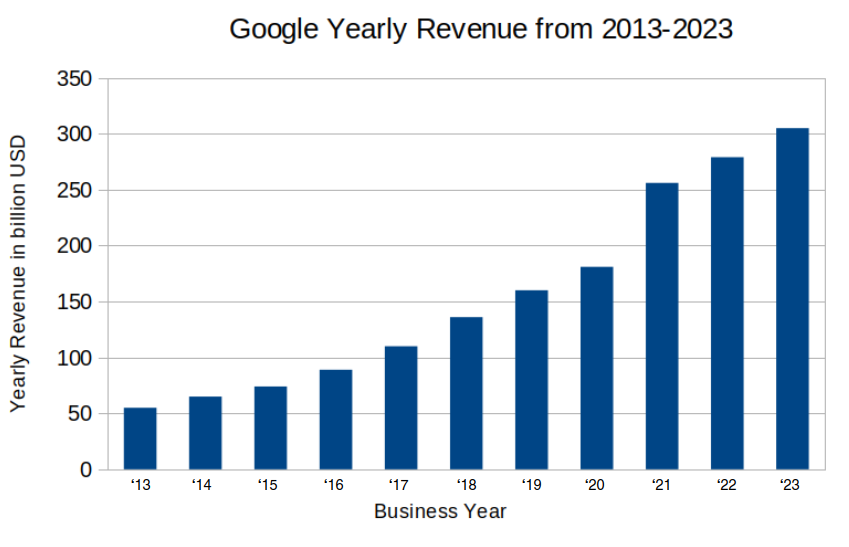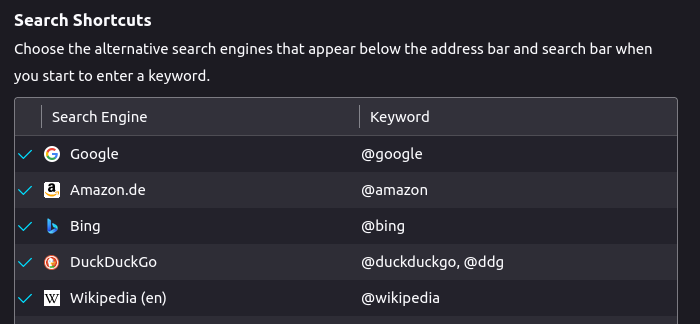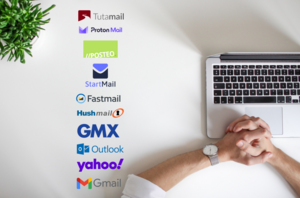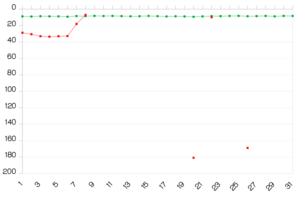Google Pays 1150 Times More for Its Search Monopoly Than for Lobbying in the EU & US
Break the Google Search monopoly! Your data is worth billions, take back control!

In 2021 Google paid €6 million for EU lobbying and $12 million for US lobbying - which is nothing compared to the staggering $21 Billion that the tech giant pays other companies to keep its search monopoly.
If you have purchased a new technological device with an internet browser, it may come as no surprise when you first open a browser to search and are greeted with the well-known multicolored G logo over a white background.
Google search holds a startling 90% market share against all other search engines.
Google Search Monopoly About to End?
This status has landed them in hot water for anticompetitive behavior. An ongoing Department of Justice investigation into Google's business practices revealed that in 2021 Google paid Apple alone over $18 Billion USD to be the default search engine in iOS, and a total of $21 Billion USD to other companies to make sure that it came pre-installed across multiple browsers and devices.
Oops, That Should Be Kept Secret
Recent testimony by Kevin Murphy, one of Google's primary economics experts, has revealed that the default search deal with Apple has so much value to the company that they are paying 36% of all Safari search ad revenue back to Apple in order to keep this dominance - a clear violation of antitrust legislation.
On X BigTechOnTrial wrote:
"Google’s witness just let leak that it shares 36% of its search revenue with Apple. Probably the biggest slip of the entire trial."
This bombshell is a hard cut against Google's defense: it's out in the open that Google used illegal methods to keep its 90% market share on search. Google tried hard not to disclose this information claiming that it would "undermine Google's competitive standing in relation to both competitors and other counterparties."
It looks like these payments were made so that Apple themselves would not develops their own search engine according to testimony made by Apple executives in September 2023.
Your Search Is Worth Billions
That first initial search, even if it is for an alternative search engine like DuckDuckGo, if launched through Google Search displays ads and in turn generates profits for Alphabet. This may not seem like a big deal, but if every initial search generates revenue, the global market for that first single search is immense. With margins like this at stake, it is clear why Google stoops to anti-competitive business practices in order to stack the deck in their favor. In addition, most people will never change the pre-installed search engine.

This kind of practice isn't new to tech and in the early 1990's the US government took Microsoft to trial with particular emphasis on their antitrust behaviour in bundling Internet Explorer in their Windows operating system, claiming that this took steps to prevent competition in the growing "Browser Wars". If this practice warranted major litigation against Microsoft, then there is no reason that Google's paid positioning of their product on third-party devices should justify the same type of inquiry.
Antitrust Laws Be Damned, Legal Fines Are Just Costs of Operation
Luckily, the United States vs Google LLC. case was opened in October 2020 and after three years we are finally seeing the heads of Google having to testify in court and how they attempt to justify their business practices. We might finally have a legal ruling that decides, is Google a monopoly or not?
This is not the first investigation for Google, of course. In the EU, there's an ongoing debate whether Google Analytics can be legally used by EU companies; here it is not about monopolistic issues, but whether using Google Analytics violates the European privacy regulation GDPR.
 Everyone knows that Google is the No 1 search engine. But now we will find out that its not due to its great results, but simply because Alphabet pays to be the default.
Everyone knows that Google is the No 1 search engine. But now we will find out that its not due to its great results, but simply because Alphabet pays to be the default.
Anti-Competition Hurts Markets
Google operates primarily from its Googleplex epicenter in Mountain View, California. The business mantra of the United States is that free markets are the only way the economy can continue to generate profits and allow for continued growth. Unfortunately, Big Tech along with major companies operating within the Finance, Industry, and Real Estate (FIRE) industries have discovered the advantages of abandoning free market competition in favor of pushing for shared monopoly markets, and so has Google. This is easy to see in the field of smart phones. Which operating system would you like to purchase? You of course have choices as a consumer, between two parties Apple or Android. Are you thirsty? Why not choose between a Pepsi or a Coke?! Yes, there are other great alternatives like GrapheneOS (built on Android) but they can only operate on a donation model and, due to the dominant presence of Google's Android, stand no chance to make headway against the tech giant.
Regulatory bodies argue that Google's buying default status is not only unethical, but it is illegal.
There is a long standing practice in the tech industry of buying out competition instead of allowing them to grow. This practice effectively snubs out market threats while not requiring the larger company to make any major changes in offering a better product, major innovation, or lowering their prices. Google's monopoly style approach to business is not new, but the step of actively bribing other hardware and software manufacturers to pushing their product stifles innovation and prevents alternative search engines which may not have as deep pockets from being offered a seat at the table.
This moves beyond pushing to influence the behavior of other for-profit companies, even Firefox which is developed and supported by the Mozilla Foundation, a non-profit, ships with Google - the monopolist - as the default search provider.
You can of course change this under the settings options - even when using Android or Google Chrome. But let's be honest: Who changes the default search engine after purchasing a new device?
However, if you think the fact that these options are available makes this court case moot, you need to honestly ask yourself: would your less-technically capable family or friends know how to access the settings to look for alternative search engine and replace Google with something else?
There are also many alternative ringtones for iOS calls and message notifications, but how often do you hear those default pings when your out and about?
Just having the option to change the default is something else entirely than offering a different default or making people pick their preferences upon launching a new device.

Anti-Competition Hurts Customers
Not only do these monopolistic practices harm the natural development of innovation within the tech industry, but they also shift corporate goals with many startups not seeking to become their own large business themselves, but become noticable enough that Google buys them out. In these cases Google has positioned themselves as a major customer whose interests far outweigh those of the average personal customer who may be looking to purchase a product.
Beyond providing a search function Google Search has turned you the customer into a product for advertising.
Your data does not stay with Google. You receive a nice list of potential dinner recipes while Google sells your personal data to advertising agencies. This can include your sex, gender, age, location, not to mention any information gathered from your search history. The internet should not be this way.
Freedom of Competition is Necessary for Freedom of Speech
Google is a business, and its search function operates in a way that generates revenue, which can lead to users becoming digitally isolated in what Eli Pariser termed a "Filter Bubble". If you are logged into a Google account while searching, the search results will be catered to your personal interest which can have devastating consequences. This kind of algorithm can effectively split a populus and result in parallel echo chambers which prevent proper dialogue over shared sources of information.
These practices not only put the customer at a disadvantage due to the vendor lock-in that they find themselves living in, but it also has major impacts on the freedom of speech for internet users. If Google Search accounts for 90% of web searches worldwide, than these users are subject to the content policies which best fit the philosophy and ultimate profit goals of Alphabet. If a single corporate entity is solely responsible for the information that the public receives, there is a fine line to how this information is presented without having negative consequences in the function of democratic societies.
If Google were to decide one day that some kind of story shouldn't be presented in search queries, that would mean 90% of internet searches would not provide links to this information. This isn't a dystopian paranoia either, when presented with such requests at the behest of the Chinese Communist Party (CCP), Google willingly bends over backwards to remove historical information from searches that have been deemed harmful to the image of the CCP.
Not only does this type of practice and Google's monopoly harm our freedom of speech, even our language itself cannot escape the massive presence of Google with the name itself becoming synonymous with "to look up" or "search".
In the end, these issues would not magically go away if the US courts actually break up Google's monopolistic power. But at least less-problematic alternative search engines would finally get a chance of becoming mainstream.
Top 5 Tech Monopolies:
Depending on the fallout of these court hearings the legal crosshairs may land on other tech companies as well. Is Amazon a monopoly? What about Facebook or Microsoft? The trendy business practices that brought Big Tech to power may come back to bite them. We're eagerly waiting to see what kinds of antitrust claims can be made against these unethical behemoths.
1. Google - Paying to dominate the search engine market.
2. Apple - Locking developers and customers into their App Store.
3. Amazon - Offering cheap online shopping that has caused main street shops to close their doors.
4. Facebook - Meta is buying and selling your personal data through apps like Facebook, Instagram, and WhatsApp
5. Netflix - Streaming video and soon to be video games have reshaped the way the world watches TV, the only downside is you don't own your media.
Break Free of Big Tech
If you are looking to break free of Google's monopoly as a search engine, there are some great alternatives to choose from. To name a quick few, we recommend you check out DuckDuckGo and Ecosia.
DuckDuckGo

DuckDuckGo (DDG) has built itself to be a major player in the search engine space. They are now offered in the settings menus from many browsers by default and can be set as your primary search engine. At DuckDuckGo your privacy matters and they cater their searches with this in mind. They also offer their own browser with great built-in privacy tools and can also provide @duck.com email address aliases which play well with your secure Tutanota account. I, myself, use DDG as my primary search engine and I can full-heartedly recommend them.
Ecosia

Ecosia is a German-based search engine which rose to fame with their eco-friendly image. Your searches are funded by ad revenue, but a chunk of this revenue is spent planting trees, over 185 million at the time of writing, and promoting other climate friendly causes. The registered B-Corp combines search results from Yahoo, Bing, and Wikipedia to provide you with accurate results while supporting a great cause. They have also made their way to the status of being a major player and can be manually added as a default search engine in Chrome, Safari, and Brave Browser.
Conclusion
Only time will tell how the US judicial inquiry into Google's monopoly in the search market plays out, but we as consumers can already take steps to push back against Google and other Big Tech monopolies by utilizing some of the great privacy-first alternatives. Check out some of our search engine recommendations, why not use LibreOffice instead of Microsoft's telemetry ridden office suite, and of course you can always exchange the Google calendar with Tuta and drop Gmail to create your secure Tuta Mail account!











